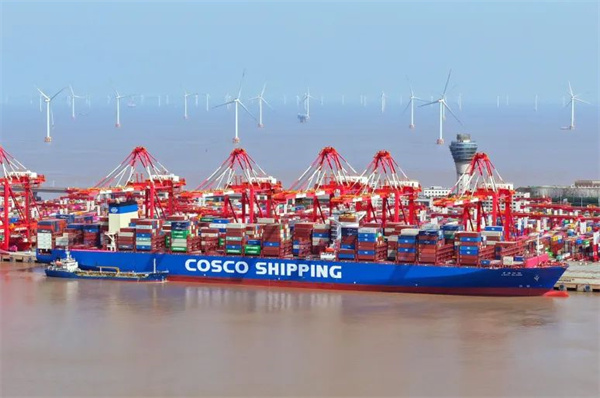China Marine Bunker (PetroChina) Co., Ltd. (CHIMBUSCO), a subsidiary of China COSCO SHIPPING Corporation Limited (COSCO SHIPPING), has successfully completed the country’s first fully digital bonded bunker fuel delivery at Shanghai Yangshan Deepwater Port on April 1.

China Marine Bunker (PetroChina) Co., Ltd. completed the country’s first fully digital bonded bunker fuel delivery at Shanghai Yangshan Deepwater Port on April 1. [Photo/sasac.gov.cn]
Using an electronic Bunker Delivery Note (eBDN), CHIMBUSCO supplied 1,300 tons of low-sulfur fuel oil to COSCO SHIPPING’s “CSCL GLOBE” vessel, marking a milestone in China’s transition to digitalized marine fuel bunkering.
The eBDN system replaces traditional paper-based bunker delivery notes with digital fuel metering and real-time data transmission. It ensures greater transparency and efficiency by digitally transmitting fuel supply information to all relevant stakeholders.
This pioneering bunkering operation was made possible through a new digital bonded bunkering service platform jointly developed by CHIMBUSCO and COSCO SHIPPING TECHNOLOGY Co., Ltd. in the Shanghai Lin-gang Special Area. The platform integrates customs and maritime regulatory modules and enables end-to-end digital processing, from fuel request initiation and contract signing to regulatory approvals and electronic document generation.
During the operation, the “CSCL GLOBE” initiated a fueling request via the platform, which was processed by CHIMBUSCO. The company then submitted an online application to customs and maritime authorities. Throughout the bunkering process, real-time data from the mass flow meter on the supply vessel was automatically transmitted to the platform and regulatory systems, ensuring full transparency. Upon completion, the eBDN was automatically generated, enabling streamlined customs clearance, carbon emissions tracking and automated digitalized settlement between stakeholders.
As the global shipping industry continues to evolve, digital bunkering enhances operational transparency, service quality and regulatory efficiency. It simultaneously minimizes port wait time for shipowners and supports the blockchain-based management of marine fuel’s end-to-end carbon footprint.
(Executive editor: Wang Ruoting)